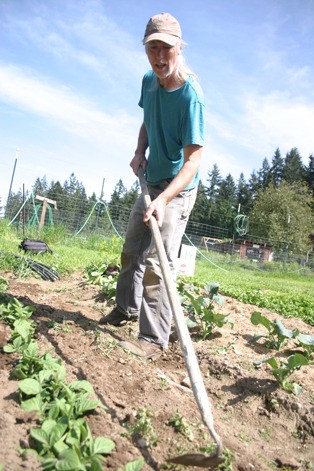At the behest of the city council, Langley staff will take another look at how to encourage garden and farm production within city limits.
After the last council meeting May 5, Director of Community Planning Jeff Arango reported that he did not see a way to create a special water rate for the Community Garden, especially when some of the produce harvested by Chris Korrow is sold commercially. Essentially, the city did not want to be viewed as subsidizing a commercial venture.
“It seems problematic to create an agricultural rate or different rate, because they are profit-driven,” Mayor Fred McCarthy said.
Korrow raised the issue at a council meeting in April and asked the city to consider a different rate. Currently, the Al Anderson Farm and Community Garden are tied to the residential rate because it is on the same land as the house from which the acreage was donated in 2010 by the Anderson family. Korrow said he paid $700 last year for water use over what was essentially three months of production at his one-third acre plot that grows broccoli and garlic, among many other vegetables. And it was all for a profit that amounted to less than the $2,000 to repair his top-of-the-line spader last year.
Despite hesitation from the city staff, Langley councilwomen Rene Neff and Margot Jerome pushed for another evaluation of how the city could help the garden and farm.
“We need to think of how the farm helps the community at large,” Neff said.
Arango raised the issue that if a lower rate was created for the garden and farm, the lost revenue would need to be made up elsewhere within the city’s waterline system, probably by residential or commercial users.
Councilman Thomas Gill proposed looking into raising the standard per month gallon usage limit before a higher rate kicked in for all water users in the city. That way, during the high use months in late spring and through summer, the water bill could be lowered without changing the rate.
“An extra 2,500 gallons per month during the summer could encourage them to have a garden,” he said.
McCarthy agreed to have city staff take another look at finding a workable solution to the farm’s request and the council’s concern.



